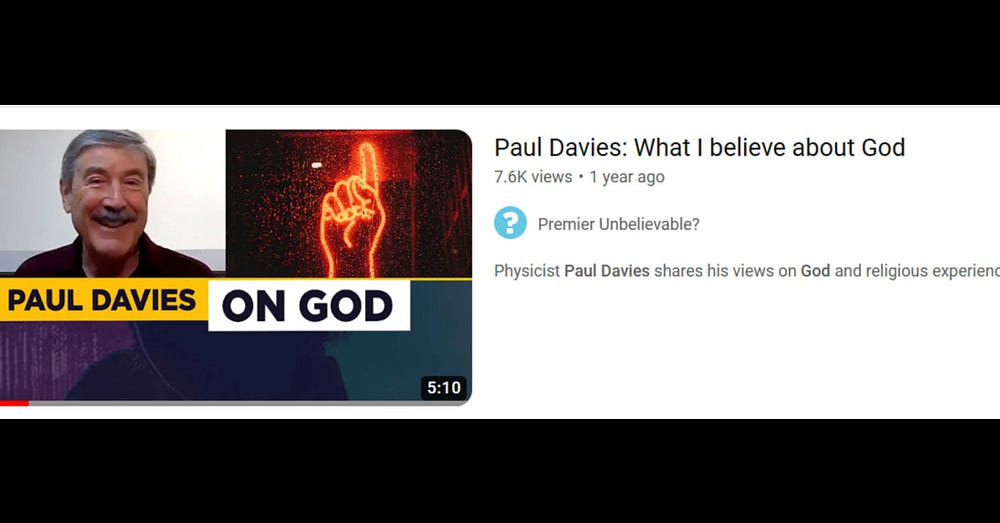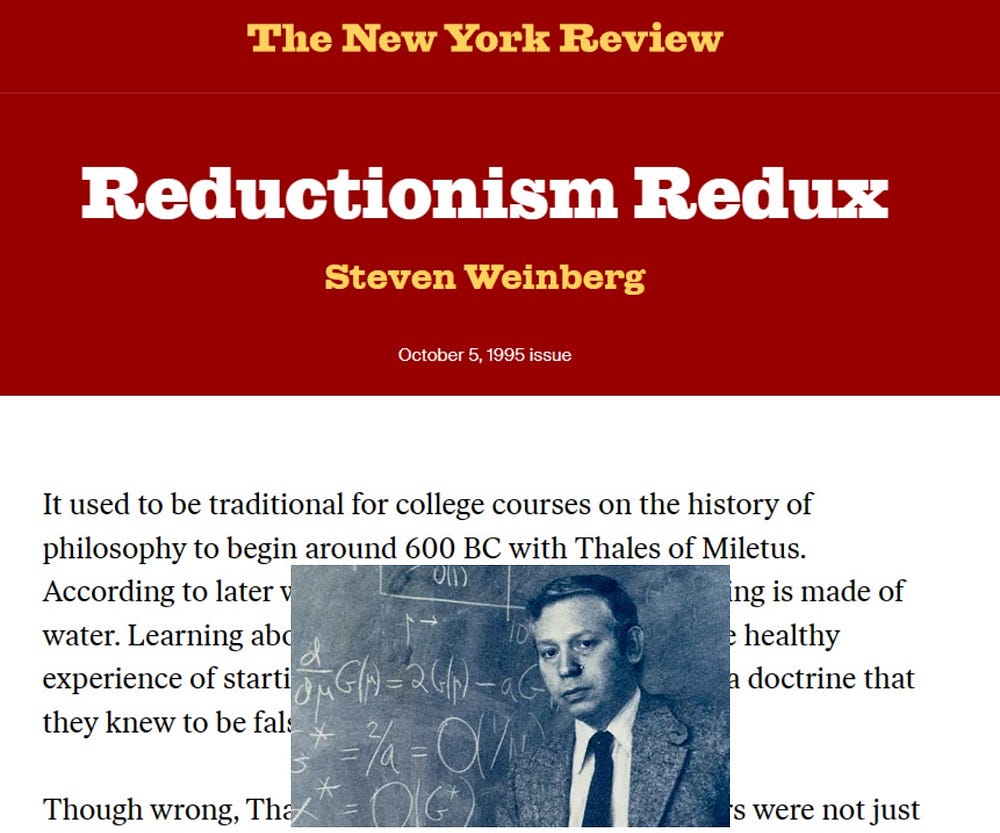Paul Davies is a physicist and writer of popular books on science. To use Davies’s own words about the theoretical physicist John Archibald Wheeler, he is “not afraid to tackle deep philosophical questions”. He’s also not (to use Davies’s words again) “conventionally religious” or “traditionally religious”… However, this essay argues that the relevant positions Davies takes on physics and cosmology are, indeed, unconventionally religious.

“Brandon Carter has frequently regretted his own choice of the word ‘anthropic’, because it conveys the misleading impression that the principle involves humans specifically, rather than intelligent observers in general.”
(See source of this passage here.)
Paul Davies sees himself as being in the mould of the American theoretical physicist John Archibald Wheeler (1911 — 2008).
Firstly, Davies tells us that John Wheeler was
“not afraid to tackle deep philosophical questions”.
In addition, he was
“not conventionally religious, but inspired by a reverence for nature and a deep sense that human beings are part of a grand scheme which we glimpse only incompletely”.
Finally, Davies tells us that Wheeler was
“bold enough to follow the laws of physics wherever they lead”.
It’s surely not unfair to say that Davies is also talking about himself here.
It’s not unfair to say that because Davies “is not afraid to tackle deep philosophical questions”. He’s not “conventionally religious”, but he still has a “deep sense that human beings are part of a grand scheme”. Finally, Davies believes that he is “bold enough to follow the laws of physics wherever they lead”.
In more detail.
Davies raises all sorts of philosophical questions which he deems to be very deep. He also often says that he’s not “traditionally religious” or “conventionally religious”. This basically means that Davies is still religious — just not traditionally or conventionally so. And, in terms of physics alone, Davies is bold enough to argue that the laws of physics may not be “immutable” after all.
This last idea is something which Davies took directly from John Wheeler.
Davies himself told the following story:
“I once asked Wheeler what he considered his most important achievement, and he answered ‘Mutability!’”
What’s more, neither would it be unfair to say that in the following passage Davies is talking about himself again. Thus:
“Throughout history, prominent thinkers have been convinced that the everyday world observed through our senses represents only the surface manifestations of a deeper hidden reality, where the answers to the great questions of existence should be sought.”
More tellingly, Davies continued:
“The word ‘occult’ originally meant ‘knowledge of the concealed truth’ [].”
These charges are levelled against Davies because he often talks in terms of deep questions, and the — or his! — deep answers “to the great questions of existence”.
Paul Davies Against Other Scientists
Paul Davies sometimes has a problem with people picking up on what they take to be his religious views. However, this often depends on Davies’s questioner and/or his audience at the time.
For example, Davies wrote:
“Many scientists will criticise my E/F inclination as being crypto-religious”.
[E = “a life principle”. F = “the self-explaining universe”.]
Of course, Davies also tells us why many scientists deem his inclinations to be crypto-religious.
For example, the following is what such scientists (supposedly) don’t like about Davies’s position:
“The fact that I take the human mind and our extraordinary ability to understand the world through science and mathematics as a fact of fundamental significance [].”
Davies adds that such scientists believe that this position
“betrays [] a nostalgia for a theistic world view in which humankind occupies a special place”.
This shows that Davies has as much of a problem with other scientists’ views as some scientists have with his own… as we shall see.
So now let’s get something straight out of the way:
I too deem many of Davies’s positions to be… well, crypto-religious.
Actually, I wouldn’t even use the prefix “crypto”. And that’s because Davies’s religious positions don’t seem to be hidden.
For example, Davies himself says that
“if I am honest I have to concede that this starting point is something I feel more in my heart than in my head”.
He finishes off with these words:
“So maybe that is a religious conviction of sorts.”
And, elsewhere, Davies talks in terms of his “cosmic religious feeling”.
[See Paul Davies’s book God and the New Physics, which was published way back in 1983. Davies’s views can also be tied to theosophy. Particularly, theosophy has it that the evolution of Homo sapiens is an expression of the wider evolution of the Universe. See here. See ‘Paul Davies: What I believe about God’.]
Paul Davies’s Rhetoric and Ideology
Paul Davies indulges in a fair bit of psychological — and even political — theorising about those scientists who oppose his views (as well as those who oppose views very similar to his own). However, he doesn’t seem to like it when people do the same thing to both himself and his own views.
For example, Davies says that his views — and views he’s sympathetic to — are met with a “hostility” which “does carry the hallmarks of an extra-scientific agenda”. He also states that the criticisms of his ideas “carry barely concealed overtones of an ideological agenda”. …
Surely Davies must be able to guess the responses to such accusations. Here’s one:
Paul Davies, along with those people who take similar positions to himself, often show hostility to what they call “atheism”, “materialism”, “reductionism” and “scientism”. And their hostility shows all the hallmarks of an extra-scientific, ideological and/or religious agenda.
So perhaps readers should (or at least they could) simply ignore all the psychologising and politicking on both sides. That said, this rising-above-the-intemperance would surely be an artificial (or contrived) stance. And that’s primarily because everyone interested in this debate would still be well aware of the various elephants in the room.
All that said, is Davies actually religious?
Is Paul Davies Religious?
Superficially, Paul Davies’s acknowledgment that Homo sapiens are no more than a (mere?) “accidental by-product of haphazard natural processes” (this expression seems to have become a cliché — see here) is certainly not a position that’s easily squared with Christianity (though many Christians have accepted evolution) or with any other specific monotheistic religion…
However, no one I know has ever accused Davies of being a closet Christian or even a closet monotheist… at least not one of a (to use Davies’s own word) “traditional” kind.
In any case, in one breath Davies stated that Homo sapiens are a “accidental by-product of haphazard natural processes”. Yet, in the next breath, he talks poetically about “life and mind” being “etched deeply into the fabric of the cosmos” (i.e., through what he takes to be “a life principle”).
All this seems like neat and tidy shift from what Davies calls “traditional religion” into a… non-traditional religion.
Indeed, it seems like Davies has almost created his own physics-clad religion…
A new religion that, Davies must believe, just happens to be in tune with certain strands in late 20th century and early 21st century physics and cosmology.
Of course, this kind of thing has happened countless times throughout the long history of the many religions of the world. What’s more, it’s a truism to say that religion must keep on reinventing itself. Indeed, even so-called “fundamentalist” religions have carried out— historically — much reinvention, and they still do so today (as have traditional religions).
[Think here of the Church of England attempting to make its values and beliefs perfectly mimic the political and social fashions of 2023 — or at least those of the early 21st century — see here. Of course, representatives of the C of E will strongly deny this and attempt to tie the political peculiarities and specificities of 2023 to specific theological and religious texts written well over a 1000 years ago. Perhaps religions must do this kind of thing simply in order to survive.]
Paul Davies’s Teleology for the 21st Century
Paul Davies’s central teleological position (along with his adherence to the Life Principle) can be deemed to be anthropocentric. Ironically, Davies himself uses the term “homocentrism” to refer — in a negative manner — to this fundamental position of what he calls “traditional religion”.
So Davies tries very hard to extricate himself from homocentrism.
Davies also uses the word “teleology”. He tells us that teleology
“represents a decisive break with traditional scientific thinking, in which goal-oriented or directional evolution is eschewed as anti-scientific”.
Davies has his own take on teleology. That is, it isn’t a traditional teleology. It’s a teleology that’s been updated with added strands from late 20th century and early 21st century physics and cosmology.
Davies put his own teleological position in the following way:
“In this theory, the bio-friendliness of the universe arises from an overarching law or principle that constrains the universe/multiverse to evolve towards life and mind. It has the advantage of ‘taking life seriously’, treating it neither as a completely unexplained bonus [] nor as a mere passive selector [].”
He continued:
“In short, it builds purpose into the workings of the cosmos at a fundamental (rather than an incidental) level, without positing an unexplained pre-existing purposive agent to inject purpose miraculously.”
Davies began the first passage above with the three words “in this theory”. These words are used in a third-person-kinda-way. However, it’s clear from Davies’s writings that this theory is, in fact, his theory.
As just stated, Davies frequently attempts to distance himself from traditional religion. And, concomitantly, he distances himself from homocentrism. Yet what are we to make of Davies’s claim that his theory advances the idea of an
“overarching law or principle that constrains the universe/multiverse to evolve towards life and mind”.
In addition, we have Davies’s claim that his theory
“builds purpose into the workings of the cosmos at a fundamental (rather than an incidental) level”.
How can talk of “life and mind” — and, less strongly, “purpose” — be anything other than homocentric?
Now surely this isn’t simply a merely anthropic theory — it’s outrightly anthropocentric.
Importantly, Davies — or anyone else — being homocentric isn’t the criticism here. The point is that Davies strongly denies that his overall position is homocentric.
That last claim is stated largely because Davies ties “understanding” and “comprehension” to his theory. This means that he can’t be talking about all lives and even all minds. Instead, he must actually be talking about the lives and minds of Homo sapiens. Indeed, it can be argued that Davies is actually talking about (or privileging) a tiny subset of Homo sapiens: particular physicists (such as himself), cosmologists and, perhaps, mathematicians.
Thus, Davies has selected a tiny group of Knowers or Understanders as the basis of a theory which he claims isn’t traditionally religious. Yet these Knowers or Understanders must surely constitute something very much like a traditional priest class.
Again, how can Davies’s position not be homocentric (or anthropocentric) when he comes out with passages such as the following? -
“Somehow the universe has engineered, not just its own awareness, but its own comprehension. Mindless, blundering atoms have conspired to make, not just life, not just mind, but understanding. The evolving cosmos has spawned beings who are able not merely to watch the show, but to unravel the plot. What is it that enables something as small and delicate and adapted to terrestrial life as the human brain to engage with the totality of the cosmos and the silent mathematical tune to which it dances?”
Apart from the fact that this passage comes across like a religious homily (or even a religious incantation), how can all those claims not be homocentric?
Davies even uses the words “beings” and “the human brain”.
Yes; in Davies’s story, it is beings who “unravel the plot”. Indeed, it’s not even all beings who unravel the plot. It’s a tiny subset of beings who do so— i.e., particular physicists (such as himself), cosmologists and, perhaps, mathematicians. In other words, Davies must surely be referring to a tiny group of Knowers or Understanders — those people he seems to set up as a priest class.
So why use the strong term “priest class”?
Firstly, most human minds do not (or even cannot) “understand the world through science and mathematics”.
All this must mean that Davies replicates the position adopted by fellow physicist Roger Penrose on the importance of “seeing” (what can be called) Gödel truths. (See my ‘Platonist Roger Penrose Sees Mathematical Truths’ at Cantor’s Paradise.)
Yet 99.9% of people wouldn’t recognise a Gödel truth even if it were pushed in their faces. Thus, the specialness of what Penrose calls (human!) “understanding”, and what Davies also calls “comprehension”, must be something that all human beings could only achieve (as it’s often put) in principle. That understanding (or comprehension), then, must only be latent in the majority of human minds or brains.
But is it?
In addition, what does this reliance on a human potentiality (but 99.9% non-actuality) amount to?
Are both Davies and Penrose conflating all Homo sapiens with… themselves?
Or, at the least, are they conflating all Homo sapiens with a tiny subset of them: particular physicists (such as themselves), cosmologists and (in Penrose’s case) mathematicians?
Davies also makes much of what he calls “a life principle”.
The Life Principle
Paul Davies (almost?) comes clean about his commitment to the Life Principle. However, he doesn’t use the definite article (i.e., “the”) or my own Platonic capitals. Instead, he uses the words “a life principle”.
And, in tandem with the Life Principle, Davies also comes clean about his commitment to what he calls “directional principles” and/or “teleology”.
What’s more, Davies certainly has faith in the Life Principle, at least according to Brian Miller. (See my ‘Physicist Paul Davies’s Faith in His Idea That Science is Founded on Faith’.) Miller wrote:
“[Paul Davies] also honestly stated that the reason he still had faith that such a principle or process must exist is his unwillingness to consider the possibility of a supreme intelligent agent, as assumed by most world religions, who acts in the world.”
This is Miller’s reaction to a YouTube video (‘Paul Davies & Jeremy England • The Origins of Life: Do we need a new theory for how life began?’) in which Davies does say that he has faith in the Life Principle. (Davies also says: “I would like to believe in a [life principle]…”)
Of course, Davies does offer his readers criticisms of his own position/s.
For example, he wrote:
“A life principle also suffers from the problem of singling out life and mind as the ‘aim’ of cosmic evolution, without explaining why. One could just as well nominate any distinctive and complex state of matter and enshrine its emergence in a teleological principle.”
“This objection is readily removed if one combines a teleological principle with the multiverse, because only universes with life principles built into their laws get a chance to be observed.”
That said, Davies then voices problems with that too!…
And, as a scientist, so he should.
All this is a roundabout way of saying that many of the scientists who endorse a particular theory will be well aware of many of the criticisms of that theory. Thus, in various contexts, such scientists — just like Davies — will articulate those criticisms (i.e., in their papers, books, etc.) without also endorsing (or agreeing with) them.
So Davies knows that scientists should be aware of counterarguments and any opposing data.
In any case, after raising the arguments above against the Life Principle, Davies informs his readers about a way out. Thus:
“One way to avoid this trap is to appeal to a closed explanatory or causal loop. In effect, the universe (or multiverse — it can work at both levels) explains itself.”
And, elsewhere, Davies writes:
“Or, perhaps better still, perhaps existence isn’t something that gets bestowed from outside, by having ‘fire beathed’ into potentiality by some unexplained fire-breathing agency [] but is something self-activating. I have suggested that only self-consistent loops capable of understanding themselves can create themselves, so that only universes with (at least the potential for) life and mind really exist.”
All of Davies’s positions above — to repeat — will have been articulated despite his awareness of the arguments and data against them.
To sum up. Most readers of Paul Davies’s books will be left in no doubt at all as to exactly where he stands — from a religious point of view. And such readers will also be aware of what Davies borrows from late 20th century and early 21st century physics and cosmology in order to back up his religious positions.
****************************
(*) Most of the passages from Paul Davies — in the essay above — can be found in his book The Goldilocks Enigma: Why is the Universe Just Right for Life?, which also goes by the name Cosmic Jackpot.)
(**) See my related essays ‘Physicist Paul Davies’s Deep — or Specious! — Questions About Life, the Universe and Everything’, ‘Physicist Paul Davies’s Faith in His Idea That Science is “Founded on Faith”’, and ‘Isaac Newton’s Religious Physics?’.
(***) My flickr account and Twitter account.












